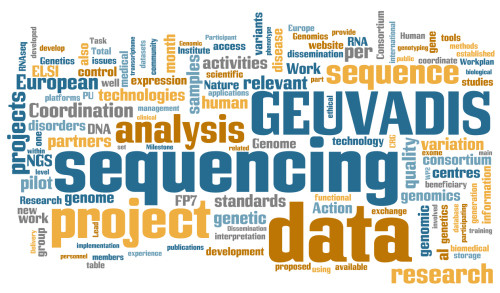European scientists, led by researchers from the University of Geneva’s Faculty of Medicine (UNIGE) in the GEUVADIS project, present a map that points to the genetic causes of differences between people. The study, published in Nature and Nature Biotechnology, offers the largest-ever dataset linking human genomes to gene activity at the level of RNA.
Understanding how each person’s unique genome makes them more or less susceptible to disease is one of the biggest challenges in science today. Geneticists study how different genetic profiles affect how certain genes are turned on or off in different people, which could be the cause of a number of genetic disorders.
Today’s study, conducted by over 50 scientists from nine European institutes, measured gene expression by sequencing RNA in human cells from 462 individuals, whose full genome sequences had already been published as part of the 1000 Genomes Project. This study adds a functional interpretation to the most important catalogue of human genomes.
‘The richness of genetic variation that affects the regulation of most of our genes surprised us,” says study coordinator Tuuli Lappalainen, previously at UNIGE and now at Stanford University. “It is important that we figure out the general laws of how the human genome works, rather than just delving into individual genes.” The biological discovery was enabled by a staggering amount of RNA data from multiple human populations.
A boost for personalised medicine
Knowing which genetic variants are responsible for differences in gene activity among individuals can give powerful clues for diagnosis, prognosis and intervention of different diseases. Senior author Emmanouil Dermitzakis, Louis Jeantet Professor at UNIGE, who led the study, emphasises that today’s study has profound implications for genomic medicine.
”Understanding the cellular effects of disease-predisposing variants helps us understand causal mechanisms of disease,” Dr. Dermitzakis points out. “This is essential for developing treatments in the future.”
A rich data resource for genetics
All the data of the study are freely available though the ArrayExpress functional genomics archive at EMBL-EBI, led by Alvis Brazma, who is part of the GEUVADIS analysis group. Open access to data and results allows independent researches to explore and re-analyse the data in different ways.
The GEUVADIS (Genetic European Variation in health and Disease) project, funded by the European Commission’s FP7 programme, is led by Professor Xavier Estivill of the Center of Genomic Regulation (CRG) in Barcelona. “We have created a valuable resource for the international human genomics community” says Dr. Estivill. “We want other scientists to use our data, too.”
Story Source:
The above story is based on materials provided by Unige, Emmanouil Dermitzakis and Tuuli Lappalainen.





